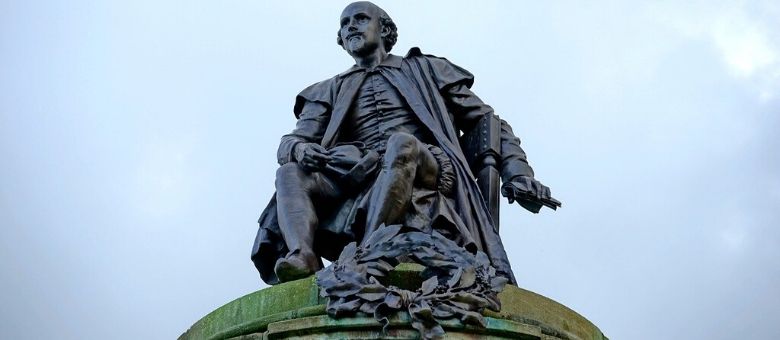At the end of each school year, Dayspring students discover the richness, depth, relevance and excitement of Shakespeare. This final week of school is a whirlwind of activity as students read and act out a Shakespeare play and choose an elective to bring to life an aspect of the play. The last day of school showcases the work of our students and their mastery of the material, as every class, along with parents and special guests, visit the presentations staged throughout the school.
Behind the scenes of this exciting week, is Upper School Teacher Mr. Schwartz. We interviewed him to get an in-depth look at why Dayspring Christian Academy dedicates an entire week of the school year to the Bard.
Q: Why does Dayspring teach Shakespeare to all grades, every year, instead of tucking it inside a broad high school course?
A: There are 4 key reasons why we teach Shakespeare across the grades, every year.
 First, Shakespeare is English. In the few centuries that our language has existed, what have been its two stalwart standard bearers? What masters of expression have tutored every English writer since? Shakespeare and the King James Bible! Shakespeare’s craft is not merely correct, it is creative. He presents the reader an exploding dictionary of vocabulary, a syntacticopia of sentence structures, he teaches the student the priceless art of coining new words and the writer-architect’s skill to style sentences according to design principles whose applications and combinations are infinite.
First, Shakespeare is English. In the few centuries that our language has existed, what have been its two stalwart standard bearers? What masters of expression have tutored every English writer since? Shakespeare and the King James Bible! Shakespeare’s craft is not merely correct, it is creative. He presents the reader an exploding dictionary of vocabulary, a syntacticopia of sentence structures, he teaches the student the priceless art of coining new words and the writer-architect’s skill to style sentences according to design principles whose applications and combinations are infinite.
Secondly, Shakespeare is drama. This most translated of playwrights (indeed, most translated of extra-Biblical authors) sets his stage across the globe. Because his sympathetic development of character—noble, ignoble, holy, and profane—quickens his players into people; and because his plotting, both bold and subtle, kindles foresight and perception, and fires the imagination; and because his themes stride among eternal principles: Shakespeare speaks in a universal voice to which every souled man, hearing, must listen.
Additionally, Shakespeare is forum. By the end of high school, not all students have read Homer or Cicero or Dante or Donne, not all have enjoyed Hawthorne and Twain and Steinbeck, not all have tried Kafka, Sartre, not all have seen Miller, but hardly an English-speaking 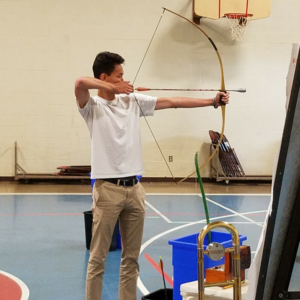 student has failed to read and to see Shakespeare. Shakespeare is common ground—the agora where all men meet to discuss ideas.
student has failed to read and to see Shakespeare. Shakespeare is common ground—the agora where all men meet to discuss ideas.
What a happy circumstance that Christians should meet unbelievers to discuss Biblical literature—when not the Bible itself, which so many foolishly reject, yet literature with a Biblical worldview, which so many of those same unbelievers somewhat unwittingly embrace. Shakespeare’s universe he received from the LORD through His Holy Word: in it, God exists and—from Him—all else; good and evil and the duty of man are defined by Him Who changes not; and history, though marred by the pernicious evils of the fallen ones, finally dances to the tune of providence.
Indeed, Shakespeare himself lived at a key juncture in the history of Christianity, when Reformation spirit was taking England, and Pilgrim character was about to take the New World.
Finally, for the reader who cares not for English and drama and forum, if he can yet care (or come to care!) about the triumph of good over evil, the tempering of justice with mercy, the trials of character that bring forth eternal gold, Shakespeare is a primer for the development of good morals.
Q: What are the vision, goals, and objectives for learning Shakespeare at Dayspring?
A: Our vision for teaching Shakespeare is for the spiritual edification of our students through literature that bears a Christian mark.
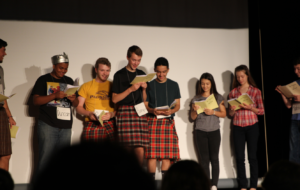 We have 5 goals, or outcomes that we can expect to see in our students through teaching Shakespeare according to the Principle Approach. They are:
We have 5 goals, or outcomes that we can expect to see in our students through teaching Shakespeare according to the Principle Approach. They are:
- To build character
- To respond to literature Biblically
- To hone the skills of perception and discernment
- To develop and enjoy fine dramatic literature
- To develop the ability to use the English language with art and expertise
In order to achieve these goals, we have objectives in place to ensure we are teaching effectively. These objectives are:
- To trace specific Biblical references in Shakespeare’s works
- To uncover Biblical principles in Shakespeare’s works
- To discover Shakespeare’s insights into humankind
- To provide a broad foundation in knowledge of Shakespeare, his writings, and their historical and geographical settings
- To practice reading and oral interpretation of play passages
- To compose English expressions after the pattern of Shakespeare
- To develop an appreciation for the following structures in Shakespearean plays: dramatic, grammatic, rhythmic
- To develop individual student Shakespearean notebooks
- To continually develop one school Shakespearean notebook and one digital folder with original student work
Q: What is one key aspect of Shakespeare that is taught at Dayspring?
A: At Dayspring, we show our students the beauty of the Pentactic. What is the Pentactic, or better stated…what does Shakespeare accomplish in the five acts of his plays? I’m glad you asked…. In fact, here is an example of Pentactic in five of Shakespeare’s best known plays.
| The Pentactic | Act I: The challenge begins. | Act II: The challenge is confirmed; further conflict is inevitable. | Act III: The conflict comes to a crisis. | Act IV: Events point to a resolution. | Act V: The conflict is resolved. |
|---|---|---|---|---|---|
| Macbeth | Villain is tempted. | Villain does the deed—murder! | Villain, conscience-stricken, begins to lose sanity. | Villain is deceived by prophecies; righteous mobilize. | Villain is killed. |
| Hamlet | The hero is roused to revenge. | The hero sets about to trap the murderer. | The hero fumbles an attempt at revenge. | The lady, driven insane by the hero’s crafty dalliance, slays herself. The villain corrupts another to help in the murder of the hero. | The hero, the villain and others (some by fearsome accident) die at one another’s hand. |
| Romeo & Juliet | Rival houses feud. Youths from the two houses fall in love. | Lovers secretly defy their families and are wed by a friar who defies his better judgment. | Hero, in a feud scuffle, kills heroine’s kinsman. Heroine refuses to marry another (promoted by family), but does not divulge her current marriage. | Heroine, to avoid second marriage, fakes her death. | Hero slays self over heroine’s “death”; heroine slays self over hero’s death. A “glooming peace” ensues. |
| Merchant of Venice | Hero 1 pledges money or life to finance Hero 2 in his marriage. Villain finances the deal. | Villain loses his daughter in that she marries into the heroes’ religion. | Hero 2 marries Heroine. Hero 1, unable to pay is about to lose his life to Villain. | Heroine saves Hero 1 through legal craft. Villain is desolate. | Heroes and heroines are confirmed in their wedlock and love. |
| Henry V | The hero is roused to a quest. | The hero is slighted and taunted by his enemy. | The hero wins an important battle. The lady (daughter of the enemy) softens to the idea of marrying the hero. | The hero, against all odds, wins the decisive battle, gives God the glory. | The peace is solemnized in the marriage of the hero and the lady. |
Q: What are some examples of electives that students can choose from for their Shakespeare week projects?
A: Bringing Shakespeare to life is one of the many unique opportunities for in-depth learning and mastery at Dayspring. For example, this year’s study is Twelfth Night. Possibilities of electives for our grade levels include:
Five Electives Pertaining to Medieval and Early Reformation & Renaissance Times, the Era of the Play
- The Elephant (This is the food elective.): This medieval inn harbored one of our play’s heroes. Come recreate the Elephant, make that medieval food, and serve it to the wayfarers.
- Courtship: What were the rules for boys and girls seeking to gain one another’s love in these olden days? Act out the beauties of courtship!
- Court Entertainment: Court disaster as a jousting jester—one misstep in humor might cost you your head at the hands of a sensitive noble. Other entertainers also needed—the coordinated, the theatrical, the musical, the goofy.
- Music and Dance: Galliards, corantos and jigs, oh my! Musicians and dancers will please apply. Composers may set the play’s song poetry to music.
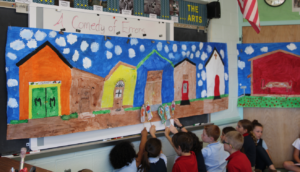 Artwork: Craft pieces in the style of Leonardo da Vinci and other Renaissance masters from the time of the play’s setting or writing.
Artwork: Craft pieces in the style of Leonardo da Vinci and other Renaissance masters from the time of the play’s setting or writing.
Four Electives Pertaining to Illyria and the Mediterranean, the Setting of the Play
- Map: Move mountains as we create our 3D Illyrian map.
- Illyria: The land of Illyria…where was it? What did those Illyrians look like? What did they do? Come learn, become an Illyrian and create an Illyrian estate.
- Piracy: The medieval Mediterranean was murky with pirates. Grab your parrot and your peg leg, let’s weigh anchor and hoist a sail to ride the waves to peril and treasure.
- Paul’s Shipwreck: Have you ever wanted to build something so that you could wreck it? This elective is for you. Come for an adventure on the high seas that could have ended in its low depths.
Four Electives Pertaining to Motifs of the Play
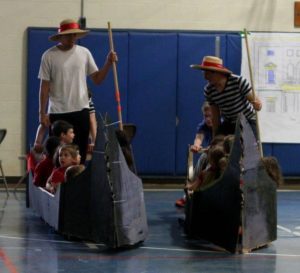 Paul’s Missionary Journeys: Grab your passport and come to the Mediterranean, where Sebastian and Viola shipwrecked in that same sea that imperiled the apostle Paul long ago. Portray Paul’s dangerous travels as God sent forth His gospel in His chosen vessel.
Paul’s Missionary Journeys: Grab your passport and come to the Mediterranean, where Sebastian and Viola shipwrecked in that same sea that imperiled the apostle Paul long ago. Portray Paul’s dangerous travels as God sent forth His gospel in His chosen vessel.- Appearance vs. Reality: Are the characters in Twelfth Night what they seem? When the outside does not reflect the inside, what dangers and miseries result? Come develop a skit to demonstrate the importance of appearance reflecting reality.
- Great Disguises in History: Viola’s disguise helped her for a time but led to terrible complications. How have disguises been used in true history? Come represent some of the great disguises in history—from ancient times to the present day.
- Castaways: Besides Viola and Sebastian, many castaways have populated history and literature. Come skit those castaway tales.
Two Electives Pertaining to Scenes from the Play
- Twelfth Night—The Artwork: We draw or paint Twelfth Night scenes and characters—shipwreck, swordplay, castles, estates, lords, ladies, fools.
- Virtual Illyria: We’ll develop a PowerPoint presentation of the geography and history of Illyria. We add some room decoration, etc., for a full-theatre experience.
Two Electives from Twelfth Night, the Actual Literature
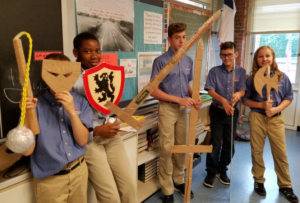 Twelfth Night—The Swordplay: We’ll develop and present the two or three main swordplay scenes. Those not familiar with rapiers may apply—besides the deft fencer and the possibility of other defts in the background, we’ll have two buffoonish fighters and other comic characters.
Twelfth Night—The Swordplay: We’ll develop and present the two or three main swordplay scenes. Those not familiar with rapiers may apply—besides the deft fencer and the possibility of other defts in the background, we’ll have two buffoonish fighters and other comic characters.- Twelfth Night—The Final Hour: We’ll develop and present the hilarious final scene of the play where a surprise meeting untangles the web that has caught all of the heroes.
Shakespeare week is truly a collaboration of planning, ideas, and thoughtful execution. We are looking forward to seeing the fruits of this year’s study!
At Dayspring Christian Academy, we are committed to raising up the next generation of Christian leaders who acknowledge the Lordship of Jesus Christ in every area of life, demonstrate a biblical worldview, become citizens of excellence in Christian character and scholarship, and aid in the restoration of America’s biblical foundation. If you would like to learn more about Dayspring Christian Academy, please contact Karol Hasting at 717-285-2000 or schedule a private tour using the button below.
